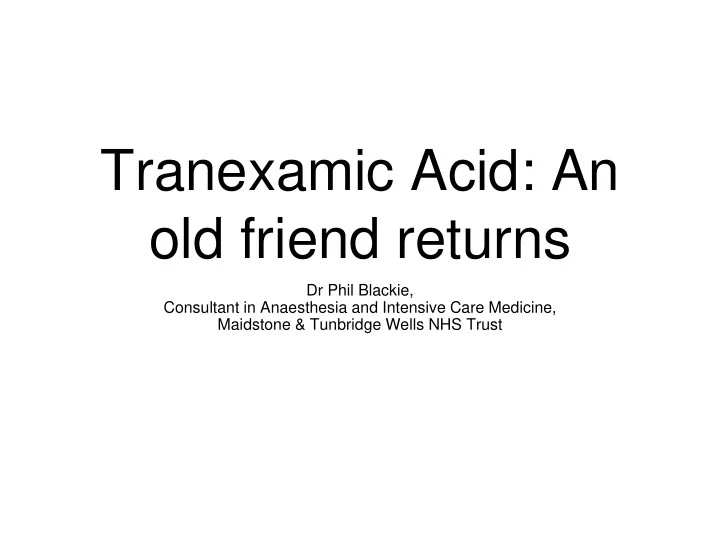

Tranexamic Acid: An old friend returns Dr Phil Blackie, Consultant in Anaesthesia and Intensive Care Medicine, Maidstone & Tunbridge Wells NHS Trust
The alternative title of this talk ‘… Without doing the research I know the results.’
Disclaimers and conflicts of interest: • I am not a haematologist • I am chair of my hospital transfusion committee • I am an advocate of tranexamic acid use
Does Anyone Recognise these people? • Same picture as previous slide
Shosuke and Utako Okamoto. • Same picture as previous slide
Why is TXA an old friend? • Developed with the purest of aims and objectives • Synthesised in Japan by husband & wife team • Original research on aminocaproeic acid • TXA developed in 1962
Mode of Action • Structurally similar to the amino acid lysine • Antifibrinolytic activity • Competitively and reversibly binds to the lysine- binding site of the tPA/plasminogen/plasmin complex thereby inhibiting the release of plasmin and subsequent breakdown of the clot
Where has it been hiding? • Ignored both locally and internationally for decades • No one is going to get rich selling TXA…. • Blood clots are bad…or are they?
My relationship with TXA • I went to medical school in the 90’s in London. • ‘….Thromboembolism is the number one cause of preventable death in the hospital patient population’ • Blood is cheap and safe? • Great idea for a drug. But too risky.
8th March 2005
The VTE Landscape in 2005
Available antifibrinolytics in 2005 • These drugs were typically restricted to cardiac surgery • Trasylol (Aprotinin) • Aminocaproeic Acid • Tranexamic Acid
• Published on January 26th, 2006 • Landmark paper in anaesthesia • Changed practice almost overnight
NEJM Conclusion and Implications • The association between aprotinin and serious end-organ damage indicates that continued use is not prudent. In contrast, the less expensive generic medications aminocaproic acid and tranexamic acid are safe alternatives. • Bayer suspended production of Trasylol almost immediately…FDA removed its approval in 2008 • TXA was back in the game for efficacy in reducing perioperative blood loss! • But surely it’s too risky to use for everyone?
The UK Perspective • 16,000 people per year suffer major trauma • Leading cause of death in those under 40 years old. • Uncontrolled bleeding is a major contributor to death, estimated annual cost to the NHS of treating severe bleeding after trauma is over £148 million. • Between 2013 and 2015, 10 women in the UK died from bleeding after giving birth.
CRASH-2 Trial, The Lancet 2010 • 25 – 35% patients with severe physical injuries show some form of coagulopathy • Four-fold higher mortality • 20,211 patients enrolled • Significant reduction of overall mortality ( 14.5% vs. 16% , respectively) and hemorrhage-induced ( 4.9% vs. 5.6% , respectively) • No increase in the rate of thromboembolism • Performed mostly in developing and threshold countries and no influence on transfusion rates by TXA was documented. • The CRASH-2 subgroup analyses have shown that all patient groups benefited from TXA administration , no differences being revealed between penetrating and blunt trauma. • A post hoc analysis showed that administration of TXA later than 3h after the initial trauma was associated with an increase in mortality which suggests that TXA should be administered as early as possible
Current NICE Guidance 2016 • QS138 Quality statement • Adults who are having surgery and are expected to have moderate blood loss are offered tranexamic acid. Rationale Tranexamic acid can reduce the need for blood transfusion in adults having surgery. This avoids serious risks associated with blood transfusion, for example infection, fluid overload and incorrect blood transfusions being given. It may also reduce the length of hospital stays and the cost to the NHS.
The WOMAN Trial, The Lancet 2017 • 20 000 women enrolled • 21 diverse geographical settings, including countries with some of the highest rates of maternal death. Women older than 16 years with a clinical diagnosis of post-partum haemorrhage • Randomly assigned to receive either 1g of intravenous tranexamic acid or a matching placebo, in addition to usual care. • Trial data showed that at least six deaths from bleeding complications were prevented for every 1,000 people treated • The current guidance recommends giving tranexamic acid for bleeding after trauma and in women with bleeding after giving birth. It is now clearer that every 15-minute delay after the first hour can reduce survival by about 10% .
Studies in progress… • CRASH-3 investigating effect on outcomes when traumatic brain injuries receive TXA • HALT-IT investigating the effect of TXA on outcomes and complications in upper GI bleeding
The Dollar reality • Cost-effectiveness of TXA in patients with traumatic injury has been calculated in three countries: • The cost of TXA administration to 1000 patients: • US$17,483 in Tanzania • US$19,550 in India • US$30,830 in the UK • The estimated incremental cost of administering TXA per life-year gained was: • $48 Tanzania • $66 India • $64 UK
Summary • Tranexamic acid reduces the risk of bleeding to death by about one third • No increase in side effects • On the WHO list of essential medicines since 2010 • TXA cost £1.57 per ampoule, most patients get two ampoules= £3.14. • Cost of unit of blood =£120 • 120/3.14= 38 patients treated for the cost of one unit of blood • TXA now given by paramedics at the scene
Take Home Message • TXA saves lives….30,000 women a year from bleeding postpartum • Should be considered alongside the great medical discoveries of vaccination, antibiotics. • A truly altruistic gift to medicine
‘… Without doing the research I know the results…’ Utako Okamoto 2016
Thank You
Recommend
More recommend